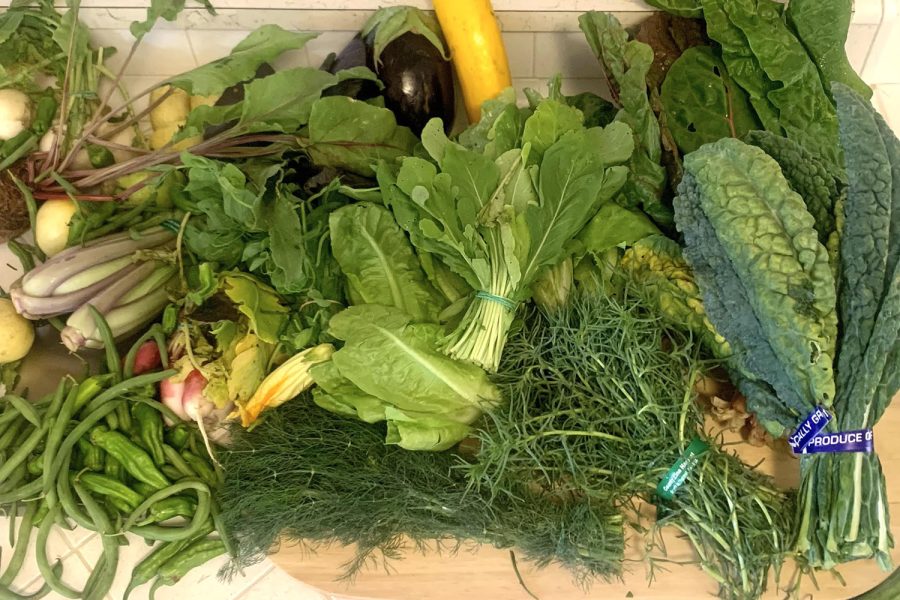Op-Ed: The difference of a day
Photo credit: Zoe Gazzuolo
A variety of produce from a Community Supported Agriculture delivery box is pictured. CSA boxes were a staple in my family’s life a year ago, as they provided fresh produce from farms directly to customers’ homes.
March 6, 2023
Six years ago, I became a vegetarian. A year after that, I was eating a gummy bear, mid-bite, when a friend told me shocking news: gummy bears and marshmallows contain gelatin, a protein derived from animal collagen. I began to question myself as a so-called “good” vegetarian, but I decided to go about my day pretending that I didn’t learn that unnerving news. Those animal-derived treats still remain in my pantry to this day.
Plant-based diets are often misconstrued. They are regarded as strict, all-or-nothing diets, which dissuades people from participating in simple, everyday, environmentally conscious or health-based decisions. Following a plant-based diet is not about being “perfect” with all of your dietary choices. What lies at the heart of these decisions, at least for me, is the purpose of living a healthy lifestyle, free from exploitative and detrimental methods harming communities and the environment around us. This goal can be achieved through any efforts to reduce personal meat consumption, not only hard-core veganism.
Global meat consumption has increased rapidly over the past few decades, and it is predicted to rise by 14% before 2030. But why is this an issue?
Producing meat and other animal products is a large driver of climate change, as it demands more land, water and energy than any other food. Furthermore, a Science study found that greenhouse gas emissions from animal products are 10 to 50 times higher than those of plant-based foods. According to the IPCC summary, in order to meet the Paris Agreement’s fundamental goal of restricting global warming to 2°C or less, “rapid and far-reaching” changes to national diet selection must be made.
Although these statistics may seem daunting, embracing small steps on the road to impact is crucial. Choosing to cut out certain meats from one’s diet, eating completely plant-based once a week or slowly limiting meat consumption are all valid and relatively easy decisions that have notable effects. To put it into perspective, the Stanford Report found that if everyone in the U.S. cut their meat or cheese consumption only once a week, it would have the same effect on the environment as removing 7.6 million cars from the streets.
Meatless Mondays is an initiative that embraces this phenomenon by encouraging people to simply skip meat once a week for the wellbeing of the environment and their health. By providing free plant-based recipes, tips to reduce meat consumption, research supporting their cause and more, the organization has successfully spread its initiative to millions of people worldwide. Their fundamental message is one that should be adopted more freely: progress over perfection.
As the company’s founder, Sid Lerner, said, “You can’t be saintly every day. It’s all about incremental changes, cutting back a little here, a little there. Whatever you do, don’t despair: You can always get back on the wagon next Monday. ”
The purpose of this piece isn’t to get meat off the table, but to get other plant-based options onto it. Often when I tell people that I’m a vegetarian, they grow worried and say something along the lines of, “Oh, I could never give up [insert meat].” The truth is, you don’t have to. A small change adopted by a significant number of people worldwide is enough to have a profound impact on our environment for the better.










MARIANA E LAUFER • Jul 20, 2024 at 10:05 pm
I feel beyond validated by your article Zoe! I believe in every word that you so caringly wrote. Actually, after being a meat eater, I myself woke up to the plight of the farm animals and the way we devastate our planet and therefore our climate change!
I could not at all touch meat and as a cancer survivor, never had a better blood test! I feel the need of helping our planet and no longer miss eating meat! Plant food and some cheese, almond milk , nuts, garbanzo, lentils and beans are just a few source of better protein!
I congratulate you on this article and yes, we need young people thinking like you!
Thank you and best to your bright future!
Warmly,
Mariana Laufer